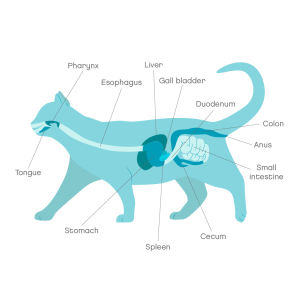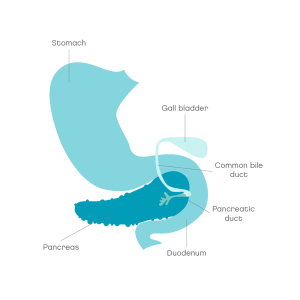Pancreatitis is a serious illness caused by inflammation of the pancreas. The condition affects cats of any age, sex or breed, although cats over 7 years old and Siamese cats are most at risk. Up to 40% of all UK cats will get pancreatitis at some time in their lives.
The pancreas is a gland in your cat’s tummy. It produces powerful chemicals to digest food in the intestines. Sometimes the gland becomes swollen and painful. Symptoms of pancreatitis include not eating, lethargy and diarrhoea. Around 50% of cats who get pancreatitis also have an inflamed small intestine and liver, a condition called triaditis. Pancreatitis needs to be treated by a vet, and not all cats recover from the illness. For cats who do recover, pancreatitis can lead to longer-term illness.
Overview
What is pancreatitis in cats?
Pancreatitis is inflammation of the pancreas.
The pancreas is a small gland located in your cat’s abdomen, close to their stomach

It has 2 important functions:
- Creating powerful digestive enzymes (digestive juices) to break down food
- Producing the hormone insulin, which lowers glucose (sugar) levels in your cat’s blood
Pancreatitis may be sudden (acute), or it may come on gradually and last longer (chronic)
Chronic pancreatitis is more common in cats (unlike dogs)
Cats who have had one bout of pancreatitis are more likely to suffer another one sometime in the future
When the pancreas gets badly damaged, your cat may become unable to digest food (EPI). It can also lead to sugar diabetes (diabetes mellitus)
How does pancreatitis happen?
- Powerful digestive enzymes (digestive juices) produced inside the pancreas start to work too soon
- The pancreas gets damaged
- The gland becomes swollen and inflamed
- Neighbouring organs, including the liver and small intestine become inflamed
In around 95% of cases, the actual cause of pancreatitis isn’t known. Vets call this ‘idiopathic’.
Possible triggers for pancreatitis
- Other illnesses, including sugar diabetes (diabetes mellitus) and inflammatory bowel disease
- Infections and parasites (for example, toxoplasmosis)
- Obesity, which can be associated with higher levels of fats (called lipids) in the bloodstream
- Toxins, including chocolate, lilies, zinc and organophosphates
- A blow to the abdomen (tummy) causing direct injury to the pancreas
- Eating food with too much fat in it.
Triaditis
Your cat’s pancreas works very closely with their small intestine, gallbladder and liver. The pancreas shares a duct (or pipe) with the gallbladder for transfer of digestive juices into the small intestine. The gallbladder sits in your cat’s liver and produces bile. Bile helps to digest fats in food. So it’s very easy for infection or inflammation to spread from the small intestine to the pancreas. and from pancreas to gallbladder and liver. This is one reason why up to 50% of cats with pancreatitis also have inflammation of their liver and small intestine. This condition is called triaditis.

Symptoms
Symptoms of pancreatitis in Cats
Symptoms of acute pancreatitis
- Not wanting to eat
- Having less energy
- Diarrhoea or soft stool (poo)
- Signs of tummy pain, including lip smacking, being restless, looking hunched
- Vomiting (being sick)
- Collapse
Symptoms of chronic pancreatitis
Symptoms are similar, but come on more gradually
- Going off food intermittently
- Diarrhoea
- Drinking more
- Having less energy
- Vomiting intermittently (from time to time)
- Losing weight
Cats are more likely to get the chronic form of pancreatitis. Since the symptoms mimic other common conditions in cats, chronic pancreatitis can be difficult to identify in the early stages of the illness.
Risk
Cats at higher risk of developing pancreatitis
- Cats who are obese (overweight)
- Cats with other health problems, such as inflammatory bowel disease and sugar diabetes (diabetes mellitus)
- Cats receiving steroid treatment
- Siamese cats with a gene that causes high levels of fat in their blood
How to reduce the risk of pancreatitis in cats
We don’t know for certain what causes pancreatitis in cats, so we can’t prevent it. However, you can reduce your cat’s risk by:
- Ensuring your cat eats a healthy diet
- Controlling your cat’s weight
- Treating and monitoring other illnesses under veterinary advice
- Being especially careful with the above tips if your cat is in a higher risk group or breed
Diagnosis
How do vets diagnose pancreatitis in cats?
There’s no specific test for pancreatitis. Vets diagnose pancreatitis based on:
- Symptoms
- Physical examination
- Blood tests
- Ultrasound scan to examine the structure and size of your cat’s pancreas
Vet treatment
Vet treatment for pancreatitis
There isn’t a specific treatment or cure for pancreatitis.
Vets treat the symptoms of pancreatitis. Dietary rest and supportive treatments help the inflamed pancreas to recover.
Vet treatment includes:
- Medicine to treat vomiting and nausea
- Fluids to prevent or treat dehydration
- Relieving pain
- Feeding a low-fat prescription diet
- Antibiotic treatment if needed
Mild pancreatitis
If your cat can keep water down, they can be treated at home with prescription medication from the vet – usually tablets or liquid
- Anti-sickness medicine
- Pain relief
- Antacids
- Special diet (low-fat prescription diet)
Severe pancreatitis
If your cat is dehydrated, they will need intensive treatment. This means staying in hospital to have:
- Life-saving fluids via a drip directly into their leg
- Anti-sickness injections
- Strong pain-killing injections
- Antibiotic injections
- Feeding through a stomach tube: your cat needs nutrition to recover from pancreatitis, but may not want to eat. If your cat is very unwell, the vet may have to give food via a tube directly into their stomach.
Home treatment
How to look after a cat with pancreatitis at home
- Give your cat medicine prescribed by your vet at the correct dose and time
- Encourage your cat to drink to avoid dehydration. Small frequent drinks are best.
- Add water to food, especially warm water from cooking chicken breast
- Syringe small amounts of water directly into your cat’s mouth
- Use oral rehydration products (‘Oralade’, ‘Lectade’)
- Offer small frequent feeds of light food, such as chicken or white fish or a prescription diet
- Keep your cat warm and quiet, and don’t let them outdoors until they’re well again
- Switch to a low-fat diet long term to reduce the workload on the pancreas and the risk of pancreatitis recurring.
Following this advice will help make sure your cat can continue their recovery in familiar surroundings at home. It may reduce the likelihood of expensive vet bills for emergency hospitalisation.
Living with a cat with pancreatitis
Even after they get better, cats sometimes suffer from recurrent bouts of pancreatitis later on.
Feeding the right diet and recognising the early signs of pancreatitis will help to keep your cat as healthy as possible for the longest time.
- Feed a balanced, low-fat diet
- Only give your cat low-fat treats
- Learn to recognise the symptoms of pancreatitis in your cat
- Call a vet as soon as possible if you recognise the familiar signs of a relapse
When to worry
When to worry about your cat with pancreatitis
Most cats with pancreatitis will start to improve within a day or two of starting the right treatment. Sometimes recovery is less straightforward, and your cat needs more help to get better.
Contact your nearest vet practice now if your cat:
- Has collapsed after persistent vomiting
- Is hunched with abdominal pain and unable to settle
- Has developed rapid or shallow breathing
- Looks pale and hard to rouse
- Has deteriorated despite treatment
- Has started to drink much more than normal
Joii can help with:
- Understanding the risks of pancreatitis in your cat.
- Recognising the signs of pancreatitis
- Managing chronic pancreatitis
- Understanding the risks and complications of pancreatitis
- Choosing the best diet for your cat
- Advice and tips for giving medicine to your cat








